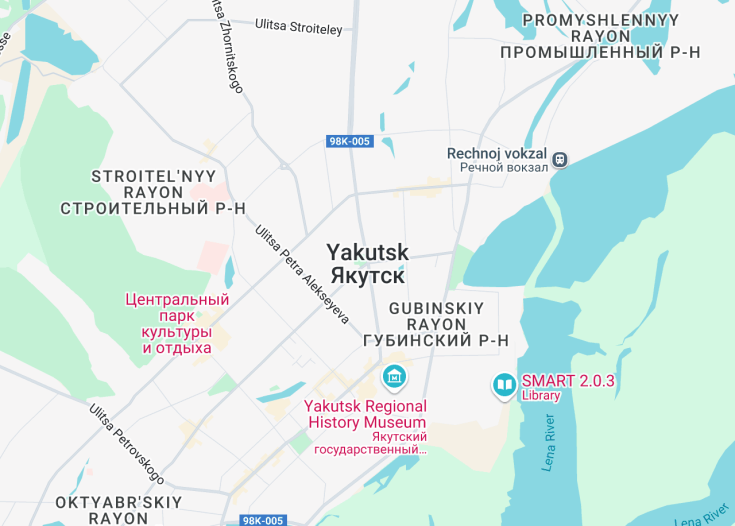Yakutsk, the capital city of the Sakha Republic, Russia, is distinctly known for its subarctic climate, making it one of the coldest cities in the world. This unique destination offers visitors a glimpse into life under extreme conditions, with winter temperatures often below -40°C (-40°F). Yakutsk is rich in cultural history, showcased in its museums and theaters. The city also serves as a gateway to the stunning landscapes of Siberia, including the Lena Pillars Nature Park, a UNESCO World Heritage site.
When visiting Yakutsk, dress in layers to adapt comfortably to its extreme climate. Investing in quality thermal clothing is crucial for a safe and enjoyable experience.
Plan your trip to Yakutsk for the summer months to enjoy its full cultural festivities under mild temperatures and the phenomena of the midnight sun.
Top things to do & see in Yakutsk
Select the following sights and activities to discover best tickets and tours available in Yakutsk.
Yakutsk: The Diamond Capital of the World
| Country | Russia |
| Time in Yakutsk | GMT+9 |
| Language spoken | Russian |
| Population | 311,760 (source: latest census data) |
| Currency | Russian Ruble (₽, RUB) |
| Airports |
|
Yakutsk, the capital city of the Sakha Republic, Russia, lies about 450 kilometers south of the Arctic Circle. This region is not just geographically unique but also culturally rich, with a prominent history that dates back to its founding in 1632 as a fort by the Cossacks. Today, Yakutsk is famous worldwide for its rich deposits of diamonds, which plays a significant role in the local as well as Russia’s economy.
Where is Yakutsk?
Yakutsk is situated in eastern Siberia along the Lena River. It’s one of the coldest cities globally, facing severe, long winters.
Distances:
| Route | Distance by car | Time by car |
|---|---|---|
| Moscow to Yakutsk | 8,270 km | Approx. 96 hours |
| Saint Petersburg to Yakutsk | 8,570 km | Approx. 100 hours |
| Vladivostok to Yakutsk | 2,070 km | Approx. 24 hours |
What is Yakutsk famous for?
Yakutsk is renowned primarily for its vast reserves of diamonds, contributing significantly to the global diamond industry. Besides this, it’s also famous for permafrost land, beautiful nature, and rich cultural heritage of the Yakut people.
History
Pre-17th Century: Early Settlements
The region now known as Yakutsk was originally inhabited by the indigenous Yakut people, part of the Turkic groups in Siberia. These early inhabitants led a nomadic lifestyle, primarily engaged in hunting, fishing, and reindeer herding, with settlements dating back thousands of years.
1632: The Foundation of Yakutsk
Yakutsk was officially founded in 1632 by the Cossacks, under the leadership of Pyotr Beketov. As one of the Russian Empire’s key outposts in Eastern Siberia, it played a crucial role in the expansion and control of the vast Siberian territories. The fort built by the Cossacks helped protect Russian frontier settlements and served as a base for further exploration and conquest of the Far Eastern regions.
19th Century: The Development of a Trading Post
Throughout the 19th century, Yakutsk became a major trading post. It was an essential stop for traders and explorers venturing into the Russian Far East. Situated on the Lena River, it facilitated travel and commerce, contributing significantly to the economic development of the region. During this period, the city’s infrastructure grew, and it became a cultural and administrative center.
20th Century: Soviet Era and Modernization
With the advent of the Soviet era, Yakutsk saw significant changes. The Soviet government established state farms and collectives, drastically altering the traditional livelihoods of the Yakut people. During World War II, Yakutsk’s strategic importance was highlighted once again, serving as a stopover for American Lend-Lease aircraft being transferred to the Soviet frontlines. Post-war, the city witnessed substantial modernization and growth, especially in education and industry.
21st Century: Contemporary Yakutsk
In the contemporary era, Yakutsk has embraced its status as a regional capital both economically and culturally. It is now home to several institutions of higher learning, including the North-Eastern Federal University, which plays a pivotal role in research and development, particularly in studies related to permafrost and Arctic conditions. Modern-day Yakutsk, while maintaining its historical charm, has become a vibrant hub for commerce and tourism in the Russian Far East.
Visit Yakutsk
What to see and do in Yakutsk
Yakutsk offers a range of attractions that showcase its unique cultural heritage and natural beauty. Key sites include:
- Permafrost Kingdom: An underground ice gallery displaying sculptures beautifully carved from ice.
- Yakutsk State Art Museum: Home to an impressive collection of Russian and Yakut art.
- Lena Pillars Nature Park: A UNESCO World Heritage site featuring stunning natural rock formations along the banks of the Lena River.
Visitors can also explore traditional Yakut crafts at local markets or enjoy a trek through the spectacular, frosty landscapes surrounding the city.
Annual Events in Yakutsk
Yakutsk hosts several yearly events that reflect its rich cultural traditions. The Ysyakh festival, celebrated in June, features traditional Yakut sports, folk dancing, and singing. In winter, the city comes alive with the Ice Sculpture Festival, where artists from around the world create intricate artworks from blocks of ice.
Best time to visit Yakutsk
The best time to visit Yakutsk is during the summer months of June to August, when the weather is most favorable. This period avoids the severe Siberian winter, offering a more comfortable climate for exploring the outdoors and participating in local festivals.
Is Yakutsk worth visiting?
Yakutsk presents a unique travel experience, particularly for those interested in exploring extreme climates and indigenous cultures. Its rich history, coupled with distinctive geological phenomena like the permafrost, makes it a fascinating destination. However, visitors should be prepared for its remote location and extreme weather conditions which might require special planning, especially in winter. Overall, for adventure seekers and culture enthusiasts, Yakutsk offers an enriching visit that is worth the logistical challenges.










